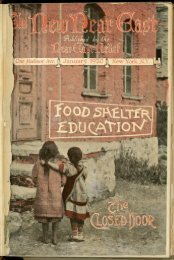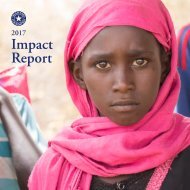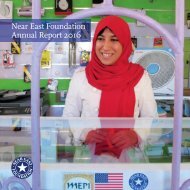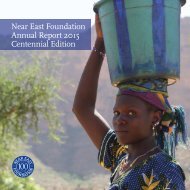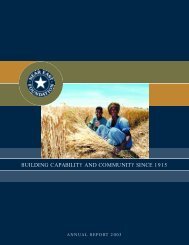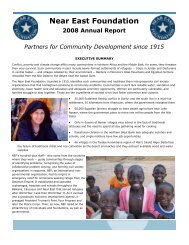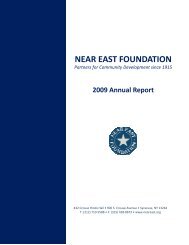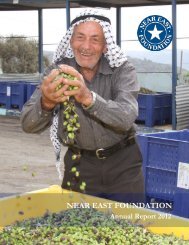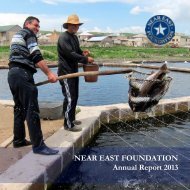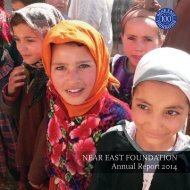2019 Near East Foundation Impact Report
Our 2019 Impact Report highlights key milestones and features stories from our work across nine countries to improve livelihoods, climate resilience, access to water and sanitation, and stability.
Our 2019 Impact Report highlights key milestones and features stories from our work across nine countries to improve livelihoods, climate resilience, access to water and sanitation, and stability.
Create successful ePaper yourself
Turn your PDF publications into a flip-book with our unique Google optimized e-Paper software.
2019
Impact
Report
CONTENTS
PRESIDENT’S MESSAGE
2019 HIGHLIGHTS
OUR PROGRAMS
OUR FINANCIALS
Near East Foundation
2019 IMPACT REPORT
OUR BOARDS OF DIRECTORS
OUR SUPPORTERS
A MESSAGE FROM OUR PRESIDENT
Each year, I look forward to the opportunity to reflect on the past year and take stock of the progress the
Near East Foundation has made with the support of our partners and donors. While challenges undoubtedly
persist as conflict, displacement, inequity, and climate shocks continue to shape the communities where we
work, so too do perseverance, progress, and community-led action. Even when turmoil and civil strife strike,
as it did in the past year, NEF’s commitment to community ownership and local capacity makes it possible
to quickly adapt and respond. I am proud to report that NEF’s impact in 2019 once again affirmed that
tailored, locally supported action translates into meaningful change for vulnerable communities and results
in tangible solutions to persistent development challenges.
This past year in Mali and Senegal, NEF worked with local authorities to strengthen climate finance systems
and to fund community-prioritized investments that improve the resilience of natural resource dependent
communities. In Jordan and Lebanon, we continued to help people earn an income safely through our
community-based livelihood support hubs (Siraj Centers). We have now broadened these services to offer
access to finance and advanced business development training to support business growth and sustainability.
We expanded our network of Siraj Centers to Syria and Iraq to accelerate community-led economic and
agricultural recovery, helping people who were displaced from their homes by conflict to find ways to
sustainably rebuild. And in Palestine, NEF facilitated collaboration between a private Israeli irrigation
company, local financial institutions, and Palestinian farming cooperatives to improve irrigation technology,
crop yields, and incomes for farmers.
Our greatest assets continue to be our local staff and partners, whose deep understanding of their
communities allows NEF to deliver responsive and effective programs that combat the root causes of poverty
and support upward mobility for those who need it most. While the frequency and scale of humanitarian
crises are daunting, I remain confident in the potential to achieve lasting impact. I am uplifted by the
resolve, determination, and ingenuity of our team, partners, and the individuals we serve. I hope you too
find promise in these pages for what our collective action can achieve.
I am deeply grateful for your support. It makes all of the impact reflected in this report possible. Thank you
for your continued commitment to building a more equitable and prosperous world.
With sincere gratitude,
Since 1915, NEF has worked to build more sustainable, prosperous, and
inclusive communities through education, community organizing, and economic
development initiatives.
Charles Benjamin
02
WHERE WE WORK
30 projects across 9 countries 274 employees wordwide
99% of staff from the communities where they work
03 04
OUR APPROACH
2019 MILESTONES
At NEF, we believe in the right of all people to build and sustain decent, dignified lives. We partner
with communities across the Middle East, Africa, and the Caucasus to build economic and social resilience,
creating opportunities for people to access the knowledge and skills needed to secure safe and sustainable
livelihoods and to exercise their voice as true participants in steering their societies. We strive to support
those who are most vulnerable, including refugees, displaced people, host communities adversely impacted
by displacement, people living in conflict zones, survivors of gender-based violence, marginalized youth,
people with disabilities, and women.
1,460,000
people
directly benefited
across 9 countries
2 new pilots
launched to
strengthen NEF business
support services
NEF Iraq
established to
support post-conflict
economic recovery
2 new offices
opened in
Brussels, Belgium
and Washington D.C.
4-star rating
from Charity Navigator
for 5th consecutive year
Commitment to
climate resilience
made at the 2019
UN Secretary General
meeting
05 06
INCLUSIVE ECONOMIC DEVELOPMENT
In partnership with local community associations, we
promote economic independence and social resilience through
entrepreneurship, access to finance, and peer networks.
Understanding that transformative, systemic change requires
investments at the individual, community and institutional
levels, we focus on building the capacity of individual
entrepreneurs and their communities. Our programs prioritize
underserved and hard-to-reach entrepreneurs and build the local
capacity of institutions to be more inclusive of these populations.
14,765
people with increased
income through
business expansion
7,295
people trained in
financial literacy and
business management
935
youth gained life
skills and positive
coping strategies
Building Resilience Among Syrian Refugees and Vulnerable Lebanese
With the highest number of refugees per capita in the world, a national economy on the decline and poverty on the
rise, Lebanon increasingly faces challenges associated with a protracted crisis. Vulnerable groups, especially women
and youth, are particularly at risk of socio-economic marginalization. As the challenges grow, so too does the need
for economic development alongside humanitarian assistance.
Spotlight: Siraj Centers
In Arabic, siraj means “lamp” or “light”. NEF’s Siraj Centers are community-based livelihood support hubs that help
vulnerable people safely find employment, start businesses, and improve their incomes. Through tailored training, access
to resources, peer networking, and market access facilitation, Siraj Centers help people gain transferable skills, create
sustainable livelihoods, improve economic resilience, and gain a sense of community to cope with the challenges they face.
Siraj Centers provide a beacon of hope, lighting the way forward.
In 2019, we drew on longstanding partnerships to grow the capacity of two local
organizations, arcenciel and Hadatha. Employing NEF’s Siraj Center model and with
NEF support, these organizations were able to provide crucial entrepreneurial
assistance and needed vocational training, helping 1,198 women and 457
men launch or expand businesses and improve their incomes.
Siraj Centers are community-run. They share standardized training curricula, educational materials, operating procedures,
and quality standards. NEF’s micro-franchise model for these hubs helps ensure high-quality programming to support
economic recovery that is tailored to each community’s needs. The NEF Siraj Center network currently includes 15 centers
in underserved communities in Lebanon, Jordan, Syria, and Iraq.
8,200
vulnerable entrepreneurs have
received support services from
Siraj Center staff in Lebanon and
Jordan since 2015
07
Establishing a Revolving Credit Fund for
Microenterprise Growth in Jordan
Vulnerable entrepreneurs in Jordan are often unable to access credit to grow
their businesses due to their perceived risky lending status, informed by limited
credit and assets, lack of sufficient documentation, and more. To help promising
entrepreneurs access needed credit, we are piloting a community-based revolving
loan fund in Jordan. Loans are provided to graduates of our micro-enterprise
development programs alongside non-financial services, like peer-to-peer
mentorship, small group coaching, and ongoing business mentoring.
69%
of adults are
unbanked in the
Middle East and
North Africa
NEF partnered with Azraq Women Productive Cooperative Association to
operate one of the funds and trained their staff to become master trainers
themselves, equipping them with the skills, systems, tools, and information
needed to support entrepreneurs and administer the loan
program. The fund is expected to support more
than 80 vulnerable entrepreneurs to grow their
enterprises, improve their income, reduce their
debt, and provide employment opportunities
for members of their communities.
Supporting Youth Employment and Enterprise Growth in Morocco
Developing Social Enterprise in Armenia
Armenia ranks 55 out of 148 on the Gender Inequality Index: women’s labor
force participation is much lower than men and most women lack resources to
attain economic security and self-reliance. Domestic violence is a pervasive issue
and is taboo in public discussion. These challenges perpetuate a cycle of violence
for women in Armenia and contribute to their isolation.
Moroccan youth face unemployment rates of nearly 25% and unemployed youth are at greater risk of
marginalization and radicalization. Entrepreneurship can provide a pathway to economic security, but young
entrepreneurs often lack necessary soft skills, access to credit, and insights into high-potential
entrepreneurial opportunities. To build the entrepreneurial ecosystem in the Safi-
Marrakech region, we engaged nine local business development service providers
to build their capacity to support high-potential youth entrepreneurs. Working
across the public, private, and social sectors, with innovative local partners like
the Emerging Business Factory, we launched a #BuyLocal campaign and
engaged 240 small business owners in trainings on business management
and expansion.
Vardenis, Armenia
Astghavard, a therapy center
for children with disabilities,
upgraded their textile enterprise
with NEF’s support.
Through the EU4Women: Economic Empowerment through Social Enterprise
project, we worked with 12 women’s empowerment organizations to establish
or expand social enterprises. The resulting enterprises ranged from a commercial
greenhouse to a community cafe to a guest house and hostel. In addition to
encouraging financial sustainability for the organizations themselves, this project
has indirectly benefited more than 600 vulnerable women through employment,
training, and support.
93%
of youth say they are more
financially independent and have
an improved outlook on the future
after participating in NEF’s enterprise
training programs in Morocco
09
10
07
CLIMATE RESILIENT DEVELOPMENT
Working hand-in-hand with local communities, we help
smallholder farmers and other natural resource-dependent
groups protect their livelihoods, maintain their food security,
and adapt their incomes in the face of climate shocks and
stresses. We work to build local capacities that ensure
communities have tools and resources to invest in climate
resilient strategies, to sustainably and peacefully manage
shared agricultural and natural resources, and to adapt and
diversify resource-dependent livelihoods.
852,591
individuals with
improved food security
658
infrastructure repairs
and upgrades
150
community-led
climate investments
202
partner organizations
with capacity built
In 2019, we joined the Global Resilience Partnership, a consortium of public and private organizations
working toward a resilient, sustainable and prosperous future for vulnerable people and places.
Spotlight: Decentralized Climate Funds
International sources of funding to combat climate change are increasingly available, but how does this money reach those
on the frontlines of the climate crisis? Often, funds are channeled to multilateral actors, centralized national authorities or
to non-governmental organizations rather than the local governments that hold primary authority over natural resource
management and adaptation. Decentralized climate funds, however, use existing governance systems to make funds
available to local communities, activating local planning committees to identify and prioritize investments in consultation
with community stakeholders.
Through the DFID-funded BRACED program, NEF and its partners worked with communities and governments to pilot
decentralized climate funds in Mali and Senegal. Working within existing governance frameworks, the project built local
capacities to manage climate adaptation funds and to invest in locally prioritized resilience projects in a transparent and
accountable manner.
11 12
Investing in Climate Resilience in Mali and Senegal
Climate change is exacerbating already challenging environmental conditions in Sahelian communities, where most
people rely on agriculture and natural resources to sustain their livelihoods. In Mali and Senegal, climate extremes
manifest in droughts, floods, and wildfires. Climate change is causing higher temperatures and increasingly unpredictable
rainfall and weather patterns, impacting food security and local economies for rural populations in the Sahel.
Between 2015 and 2019, we worked with national, regional, and local governments in Mali and Senegal to establish
local climate adaptation funds that finance ‘public good’ investments designed to build community resilience to
climate change. In partnership with Innovation, Environnement et Développement en Afrique and the International
Institute for Environment and Development, we worked with community members to prioritize and implement 150
resilience investments that benefited over 900,000 people, spanning forest restoration, agricultural development,
pastoral management, and water management systems. Vulnerable communities were prioritized through investments
in participatory, local level processes that included women and youth.
In the Mopti region of Mali, we are working to reduce poverty and conflict while improving
food security and climate resilience through inclusive community management of shared
resources, built capacity for conflict mitigation and management, enhanced agricultural
production, and greater market orientation for key agricultural value chains, such as
rice, sesame, fonio, and non-timber forest products. Between 2012-2019, this work
improved the food security of more than 130,000 people, introduced eco-efficient
practices across more than 4,000 acres, and supported the development of more
than 20 water resource management plans.
Improving Agriculural Water Mangement in Palestine
Restricted access to land, water, agricultural inputs, and markets has harmed the Palestinian agricultural sector.
Cut off from new and improved agricultural technologies, Palestinian farmers rely heavily on traditional practices,
making it challenging to increase their productivity and incomes.
Fostering Women’s Resilience in Sudan
Millions of people depend on non-timber forest products for income and
subsistence. However, many small-scale producers and harvesters in Sudan lack
access to information on markets and sustainable management practices. Barriers
are greater for women, who play a significant role in collecting, harvesting and
selling, yet historically have weaker negotiating positions with traders.
To address this challenge, we established a public-private partnership to facilitate the
adoption of advanced farming technology and overcome water scarcity in the
Palestinian agricultural sector, while increasing farmers’ crop yield and access
to capital. Working with Netafim, the Palestinian Center for Agriculture
Research and Development, three local banks, and the Palestinian Vegetable
Council, we helped more than 100 farmers adopt advanced irrigation
systems with crop management technologies. The new technology led
to reduced water and fertilizer use while simultaneously increasing
productivity and incomes.
In partnership with Friends of Peace and Development Organization and
Abna Al-Sudan Development Organization, we are strengthening women’s
associations to help women upgrade their non-timber forest products, develop
of those in the
non-timber forest
formal packaging and branding, and establish better linkages with wholesalers.
Greenhouse, Jenin
72%
product sector are
These efforts reduce local forest degradation, protect resource-based livelihoods,
State of the art ‘fertigation’ technology is helping farmers
women
and increase income.
grow more with less.
13 14
PEACEBUILDING & STABILIZATION
We are building and enhancing economic relationships
across lines of division to help promote stability through
improved trust and cooperation. We promote sustainable
economic development in conflict and post-conflict areas
alongside conflict prevention and management training
to mitigate the drivers of fragility. We further support
the integration of disenfranchised populations, including
young people in peri-urban slums, people internally
displaced by conflict, and refugees.
2,768
individuals participated
in cross-border training
and activities
480
cross-border
infrastructure repairs
and upgrades made
1,581
businesses launched
or expanded in the
West Bank
Creating New Opportunities For Olive Growers
The protracted conflict in Israel and Palestine has undermined livelihoods
and opportunities for collaboration, especially so in the agricultural sector.
As neighbors to the conflict, Jordan has played a critical role in supporting
regional stability. The olive industry is the cornerstone of rural livelihoods in
Palestine, Jordan, and Israel, and provides a point of cooperation and common
interest from which to build new relationships, institutions, and enterprises.
Building on the success and momentum of Olive Oil Without Borders, NEF
expanded this effort to new communities in Israel, Palestine, and Jordan to
strengthen cross-border economic cooperation and promote long-term, largescale
collaboration in the olive sector. From 2016 to 2019, we worked with
1,000 farmers across 37 communities to improve farming
techniques, production, and income generation. The
initiative brought together business, policy, and
academic leaders including the Palestinian
Center for Agricultural Research and
Development, the Peres Center for Peace,
Syracuse University’s Maxwell School of
Citizenship and Public Affairs, and the
Israeli and Palestinian Olive Oil Councils.
Spotlight: Cross-border Economic Cooperation
Supporting Conflict-Affected
Economies in Syria and Iraq
Cross-border economic cooperation offers a structured, depoliticized process for building trust, understanding, and
capacity for collective action in pursuit of shared interests. Working with groups in conflict to foster an environment
conducive to exchange, cooperation, and mutually beneficial partnerships lays the groundwork for improved
collaboration, conflict management, and economic prosperity for individuals and communities. This takes different
forms depending on the root causes and consequences of conflict.
The olive sector in Israel and Palestine, for instance, offers a unique opportunity to cultivate peace given its deeply
rooted cultural significance and economic potential. This was the driving force behind NEF’s groundbreaking USAIDfunded
Olive Oil Without Borders program from 2011 to 2019, which facilitated productive partnerships between
Israelis and Palestinians in the olive sector and led to the first-ever joint policy commission — allowing for the export
of 4,500 metric tons of Palestinian olive oil to Israel and generating $30 million USD in new income.
Siraj Center, Syria
Syrian food processors are
using improved techniques
to dramatically increase their
incomes, with NEF’s support.
Communities in Syria and Iraq continue to suffer from the effects of ongoing or
recent conflict. While many internally displaced persons and refugees hope to return
to their home communities, they often face a lack of livelihoods opportunities and a
challenging business environment when they return.
In Syria and Iraq, we are working to help people recover their livelihoods and access
needed vocational training. In 2019, we worked across our eight Siraj Centers in
Syria to engage more than 12,000 farmers and food producers and support the
launch or expansion of 1,687 businesses. We also established an office and two Siraj
Centers in Iraq, where we are working to help 1,000 people access the training and
resources they need to safely find employment and start small businesses.
15
10
16
WATER, SANITATION & HYGIENE
Through cross-sector partnerships, we build the capacity
of local organizations to improve access to clean sources
of water, adequate sanitation, and good hygiene for highly
vulnerable individuals. Our approach combines water,
sanitation, and hygiene (WASH) programming with civic
engagement and private sector development to minimize
the risk of disease and enable conflict-affected populations
to improve their well-being in a safe and dignified way.
531,757 3,168 13,085
people with improved
access to potable water
water infrastructure
repairs and upgrades
hygiene and sanitation
kits distributed
166
partner organizations
with capacity built
Reducing the Risk of Mortality in Sudan
Due to persistent conflict in Sudan, basic infrastructure—most notably water
and sanitation infrastructure—has either been destroyed or suffers from a lack
of maintenance. A scarcity of parts, tools, and trained mechanics has left many
hand pumps non-functional, severely reducing the amount of water available to
communities. Further, a lack of latrines and good hygiene practices puts many
communities at high risk of morbidity.
NEF works with local community associations, called supra village associations,
in South Kordofan and Central Darfur to reduce the risk of sickness and
death among conflict-affected populations by establishing community water
and sanitation committees. In 2019, we worked with the local committees to
make 3,677 WASH infrastructure repairs and upgrades and
distributed 13,085 WASH kits which included hygiene
and sanitation education materials. Our marketbased
WASH project supported the construction
of 683 latrines, including twelve at local
markets and one at a school. To support
long-term sustainability, we trained local
craftspeople and artisans to manufacture
and rehabilitate water pumps and latrines.
Spotlight: Market-based WASH
Market-based WASH introduces a livelihoods approach to water, sanitation, and hygiene through skills building and
income generation. For NEF, mainstreaming this emerging development approach includes developing and promoting
collaborative or individual WASH entrepreneurship activities; coordinating and investing in market-based WASH
interventions through private-public partnerships; and developing the capacity of local civil society organizations to
lead and sustain local WASH programs. In 2019, we piloted market-based WASH programming in conflict-affected
communities in Sudan and Lebanon and published a learning paper detailing the challenges and results.
600 million people globally lack access to improved water sources
254,000
people have
benefited from NEF’s
WASH work in Sudan
Working with Local Municipalities in Lebanon
More than 40 years of instability in Lebanon, including civil war, political upheaval
and regional conflict, has put a strain on infrastructure including housing, schools,
water, and waste management. Within Lebanon, half of the country’s water is lost
due to broken pipes and 92% of sewage runs untreated into water courses. Further,
nearly one-third of refugees in Lebanon lack access to clean water.
Our market-based WASH project in Lebanon engaged local governments in publicprivate
partnerships. NEF worked with six municipalities to develop plans for
improved trash collection and safe water treatment to benefit more than 140,000
residents. In the end, the pilot project distributed 578 waste bins, 3 garbage collection
trucks, and a water filter to improve water quality and hygiene – and yielded valuable
learnings for the future of market-based WASH in Lebanon and beyond.
17 18
FINANCIALS
NEF is committed to providing the highest levels of transparency and efficiency. See our complete FY2019
consolidated financial report at www.neareast.org/resources/#financial-reports
Revenue
2019 Funding Sources
2019 $17,067,336
2018 $16,537,456
2017 $15,201,317
88% Governments
5% Foundations
4% Individuals
3% Other
Expenses
2019 Efficiency
2019 $16,481,911
2018 $16,473,244
2017 $15,020,213
95% Program Services 4% Management/General
1% Fundraising
NET ASSETS
BEGINNING $6,168,926 ENDING $6,754,351
19 20
NEF BOARD OF DIRECTORS
FUNDING PARTNERS
U.S. BOARD OF DIRECTORS
Haig Mardikian, Chair
Johnson Garrett, Vice Chair/Secretary
Charles Bird, Treasurer
Charles Benjamin, Ph.D., President
Carol B. Aslanian
Myrna A. Barakat
Nina Bogosian Quigley
Randa El-Sayed Haffar
Mona Eraiba
Rana Gillmon
Elias Habayeb
Jeff Habib
Linda K. Jacobs, Ph.D.
Osamah Khalil
Shant Mardirossian
Robert J. Solomon
U.K. BOARD OF DIRECTORS
Anthony R. Williams, Chair
Robert Brown, Ph.D.
Johnson Garrett
Linda K. Jacobs, Ph.D.
Linda Layne, Ph.D.
Anthony G. Williams
BELGIUM BOARD OF DIRECTORS
Linda K. Jacobs, Ph.D., Chair
Robert Brown, Ph.D.
Johnson Garrett
Amr Nosseir
Anthony R. Williams
ACADEMIC COUNCIL
John Kerr, Ph.D.
John McPeak, Ph.D.
Thomas Mullins
Juliet Sorensen, J.D.
Michaela Walsh
HONORARY BOARD
Shahnaz Batmanghelidj
Amir Farman-Farma
John Goelet
John Grammer
Ronald Miller
Anthony Williams
Tarek Younes
PRESIDENT’S COUNCIL
H.E. Andre Azoulay
Ian Bremmer
Ambassador Edward P. Djerejian
Vartan Gregorian, Ph.D.
Ambassador Richard W. Murphy
Her Majesty Queen Noor of Jordan
James B. Steinberg
Ambassador Frank G. Wisner
Asfari Foundation
Armenian General Benevolent Union
Bogosian Quigley Foundation
City and Guilds Group
Cleveland H. Dodge Foundation
Comic Relief
Elmer and Mamdouha Bobst
Foundation
European Union
Flora Family Foundation
Global Affairs Canada
Global Giving
Government of the Netherlands
International Organization for
Migration
The Elsa and Peter Soderberg Charitable
Foundation
The Fulgraff Foundation
The U.S.-Middle East Partnership
Initiative
UK Department for International
Development
IMPLEMENTATION PARTNERS
Abna Al-Sudan Development
Organization
Al-Farooq Charitable Society for
Orphans
Al Hadatha Association
Arcenciel
Azraq Women Productive Cooperative
Association
Cluster Menara
CowaterSogema International Inc.
Emerging Business Factory
Friends of Peace and Development
Organization
International Development and Peace
Organization
International Institute for Environment
and Development
Innovation, Environnement,
Developpement Afrique
Jordanian Hashemite Fund for Human
Development
Maison des Associations (Safi)
Majales Alkhair for Peace and
Development Organization
Marrakech Generations
Middle East Investment Initiative
Netafim
Organization for Voluntary
Humanitarian Assistance Program
United Nations Population Fund
U.S. Agency for International
Development
USAID Office of Foreign Disaster
Assistance
U.S. Department of State Bureau of
Population, Refugees and Migration
Vitol Foundation
World Food Programme
Palestinian Center for Agriculture
Research and Development
Qawafel Al Khair
Sahab Society for Social Development
Sanabel El Nour
Sudanese Red Crescent Society
Syracuse University Program for the
Advancement of Research on Conflict
and Collaboration
UNICEF Water, Environment, and
Sanitation Programme
Women’s Development Resource Centre
Foundation
Youth Society for Self-Development
A community of generous donors makes our work possible.We are grateful for every donation we
receive and we hope that you will continue to support NEF long into the future.
To see the complete list of donors for the July 1, 2018 - June 30, 2019 fiscal year, please visit:
www.neareast.org/2019-impact-report
21 22
A TRUSTED STEWARD OF
YOUR PHILANTHROPY FOR
OVER 100 YEARS
95%
of donations
go directly to
supporting our
programs
COST EFFECTIVE PROGRAMS
NEF delivers high impact programs while keeping
our overhead costs low, making the most of
your donation. Your support of NEF helps build
knowledge, strengthen voices, and create economic
opportunity for those that need it most.
CHARITY NAVIGATOR
For the 5th year, NEF earned a 4-star rating from
Charity Navigator, America’s largest independent
charity evaluator. Only 13% of charities achieve
this top rating.
GLOBAL GIVING
NEF is consistently recognized as a vetted member
of the GlobalGiving community for being a
trusted partner and global change-maker.
23
BETTER BUSINESS BUREAU
NEF is an accredited member of the Better
Business Bureau meeting the highest standards
for ethics and accountability to ensure confident
charitable giving.
ENDING POVERTY STARTS WITH AN OPPORTUNITY.
US HEADQUARTERS
110 West Fayette Street
Suite 710
Syracuse, NY 13202
United States
DC OFFICE
1875 K St. NW
Washington, D.C. 20006
United States
UK HEADQUARTERS
7-14 Great Dover Street
London SE1 4YR
United Kingdom
EU HEADQUARTERS
Drève du Pressoir, 38
Brussels-Forest, 1190
Belgium
@NearEastFdn Near East Foundation
@neareastfoundation www.neareast.org







